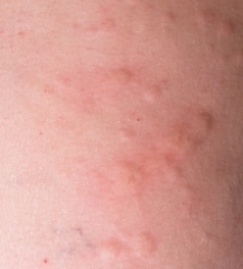
Are hives caused by nerves? Well, they certainly can be. They can be caused by numerous other things as well, though, including allergic reactions to certain foods, allergic reactions to medications, allergic reactions to chemicals in the home (like soaps, cleaning products, or laundry detergents), allergic reactions to things in the environment (like pollen or mold), insect bites or stings, bacterial or viral infections, serious illnesses like cancer or lupus, excessive exposure to sunlight, heat, exercise, and pressure on the skin (like from sitting in one position too long).
So if you have hives, how do you know what’s causing them? It can be tricky sometimes. Consider whether there are other possible causes, like if you’ve recently started taking a new medication or if you’ve been stung by an insect, and also consider whether you’re experiencing higher-than-usual levels of stress lately. If you’re not sure what’s causing your hives, see your doctor for a diagnosis. Your doctor can also recommend an appropriate treatment plan, depending on the cause of your hives.
What’s The Link Between Hives And Stress?

Stress can cause an increase in blood pressure and an increase in sweating, both of which may contribute to hives. Stress also causes your body to produce higher-than-normal amounts of certain hormones, such as cortisol. These stress-related hormones can trigger hives. Finally, prolonged stress can damage your immune system, making you more susceptible to infections and other illnesses that may cause hives. You may experience other physical symptoms related to stress in addition to hives, like an upset stomach, heartburn, headaches, or migraines.
Coping With Hives Caused by Nerves
If you have hives caused by nerves, you can reduce the likelihood of developing hives again by reducing your stress level.
- Lighten your load if you can. Say no sometimes. Ask for help with tasks at home or at work. Don’t take on more than you can handle.
- Get some physical exercise on a regular basis. According to Psychology Today, that goes a long way towards relieving stress and reducing those stress-related hormones like cortisol. Pick an activity you enjoy, because simply having fun also reduces stress.
- Eat a healthy diet. Drink plenty of water and avoid caffeinated beverages, which can make you feel nervous. Hives are often caused by food allergies as well as nerves, so watch for any reactions you might have to certain foods and make sure to avoid those things.
- Take time out to relax. Meditating, praying, or just listening to soothing music can reduce stress a lot. Make time for things you enjoy and make time for fun and laughter, too.
- Spend time with friends. Being connected to others reduces stress, whether you want to talk to a close friend about what’s on your mind or just hang out and have fun.
- Make an appointment with a professional counselor if you’re dealing with a lot of stress or having trouble coping with things in your life. Sometimes it helps just to talk to someone about things, but counselors can further help by teaching you new skills for managing stress.
Relieving The Discomfort of Hives Caused by Nerves
While the above strategies will help reduce stress and the risk of stress-related hives, they won’t get rid of hives and stress instantly. They are good long-term strategies, but when you’re itching all over, you want short-term relief and you want it fast. For that, we like a natural remedy called OxyHives. It’s a homeopathic remedy that works naturally to relieve the redness, swelling, itching, and discomfort of hives, whatever the cause of the hives. You’ll still need to take steps to manage your stress, but OxyHives can help with the physical symptoms. To learn more, just follow the link.
